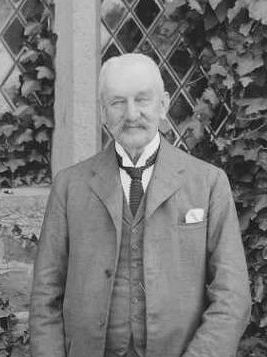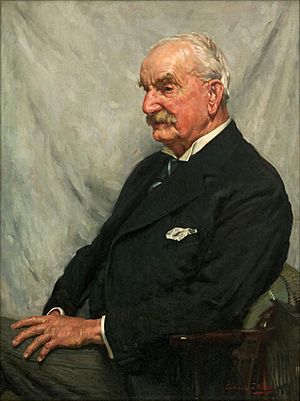George Harper (lawyer) facts for kids
Quick facts for kids
Sir George Harper
|
|
|---|---|

Harper in the 1920s
|
|
| Born | 24 April 1843 Stratfield Mortimer, Berkshire, England
|
| Died | 12 March 1937 (aged 93) Christchurch, New Zealand
|
| Nationality | New Zealander |
| Occupation | Lawyer |
| Parent(s) |
|
| Relatives | Henry Harper (brother) Leonard Harper (brother) Emily Acland (sister) Eric Harper (son) Arthur Paul Harper (nephew) Hugh Acland (nephew) |
Sir George Harper was an important lawyer who was born in England. He lived most of his life in New Zealand. He came from a big family. His father, Henry Harper, was the first bishop of Christchurch.
George arrived in Christchurch in 1858 when he was 15 years old. He joined his father who had arrived earlier. He finished school in Christchurch. After that, he worked on farms before becoming a lawyer.
He faced a difficult time when his brother Leonard caused financial problems for their law firm. George lost his license to practice law for five years. After he was allowed to practice law again, he started his own firm. George also had a big family. Sadly, three of his sons died in World War I.
Harper was involved in many community groups and clubs. He was made a knight shortly before he died. He passed away at 93 years old. He had lived longer than his wife and most of his children.
Contents
Early Life and Journey to New Zealand
George Harper was born in a place called Stratfield Mortimer in England. His father was Henry Harper. George was one of fifteen children in his family. He was the fourth son.
He went to school at Radley College and then Eton College. His parents, four brothers, and a sister moved to New Zealand in 1856. His father became the first bishop of Christchurch. George followed them two years later. He arrived in Christchurch on a ship called the Regina in November 1858.
In Christchurch, he continued his education at Christ's College from 1859 to 1862. He was a very good student there.
Working on Sheep Farms
After finishing college, George Harper spent four years working on sheep farms. He and his oldest brother, Henry, rented a farm called Malvern Hills from their father. George also managed another farm called Avoca. This farm was owned by his older brother Charles.
In 1864, the West Coast Gold Rush began. People wanted to find a better way to travel between Christchurch and the West Coast. George Harper helped by driving 500 sheep over a high mountain pass to Hokitika. This pass was called Browning Pass. However, it was too high and difficult for regular travel.
In 1866, Harper went back to England to study law in London. He finished his law studies in 1869. He then returned to New Zealand in 1870.
Becoming a Lawyer in New Zealand
When George Harper came back to New Zealand, he joined a law firm. It was owned by his brother Leonard and Philip Hanmer. George started as a clerk in 1870.
Later, George Harper became a partner in the firm. The law firm changed its name several times as new partners joined. George Harper was in charge of the legal work. His brother Leonard handled the money side of the business.
George Harper was very good at law that dealt with local councils and communities. He also helped to update the rules for the Supreme Court in the 1880s.
A Difficult Time
In 1891, George's brother Leonard left New Zealand. Over the next two years, it became clear that their law firm had serious money problems. George Harper faced a very difficult situation.
In 1894, George Harper lost his license to practice law. This was a very hard time for him. But he did not give up. He started working as a clerk for another lawyer. In 1899, after five years, George Harper was allowed to practice law again.
Starting His Own Firm
After getting his license back, George Harper started his own law firm. In 1905, his son Eric and another lawyer named Guy Dobrée Pascoe joined him. The firm was then called George Harper, Son and Pascoe.
Sadly, his son Eric was killed in World War I in 1918. The law firm continued to grow and change names as new partners joined. It kept George Harper's name even after he passed away.
Helping the Community
George Harper was a member of many different groups and organisations. He was the president of the Canterbury Law Society in 1910 and 1911. He was also the president of the Christchurch Club.
During World War I, he started a group called the Citizens' Defence Corps. This group helped recruit 3,000 men and looked after soldiers' interests. George Harper was also the chairman of the Christchurch Domains Board for many years. This board looked after public parks and gardens.
He was a governor of Christ's College, where he had studied. He also helped with the McLean's Institute, which was a charity.
George Harper also wrote a history of Cathedral Square in Christchurch. This writing helped the city council decide not to build a war memorial there.
Honours and Awards
George Harper received special recognition for his work. In 1918, he was given the Officer of the Order of the British Empire (OBE) award. This was for his services with the Citizens' Defence Corps during the war.
In 1937, just before he died, he was made a Knight Bachelor. This meant he could use the title "Sir" before his name.
Family Life and Passing
On November 21, 1871, George Harper married Agnes Loughnan in Christchurch. Her father used to be a judge before moving to New Zealand. The Harpers lived in Papanui, a suburb of Christchurch.
George and Agnes had ten children: two girls and eight boys. Sadly, two of their children died when they were very young. Even more tragically, three of their sons died in World War I: Gordon, Edmond, and Eric. Another son, Cuthbert, died in 1921 from an illness he got during the Second Boer War.
George Harper's wife, Agnes, passed away in March 1931. Their son Philip also died in 1933 after an operation. George Harper died six years after his wife, on March 12, 1937. He was 93 years old. At the time of his death, his daughter and two sons were still alive.
Legacy
Harper Avenue, a main road in Christchurch, is named after Sir George Harper. This shows how important he was to the city.
Images for kids
 | Emma Amos |
 | Edward Mitchell Bannister |
 | Larry D. Alexander |
 | Ernie Barnes |




